#OrganicFarmers
Explore tagged Tumblr posts
Text
Discover the Best Organic Products at KP E-Mart

In a world where health and sustainability are becoming increasingly important, KP E-Mart stands out as a trusted provider of high-quality organic products. From fresh organic almonds to unpolished kodo millet, we offer a wide range of natural, chemical-free foods that support a healthier lifestyle. This guide will introduce you to our top products, ensuring you make informed choices for your diet and well-being.
Fresh Organic Almonds: The Perfect Snack
Fresh organic almonds are a delicious and nutritious snack. Packed with vitamins, minerals, and healthy fats, they are perfect for boosting your energy and supporting heart health. At KP E-Mart, our almonds are grown without synthetic pesticides, ensuring you get the purest form of this superfood.
Organic Coconut Oil: Versatile and Healthy
Organic coconut oil is a versatile product with numerous health benefits. Whether you use it for cooking, skincare, or hair care, our organic coconut oil is cold-pressed to retain all its natural goodness. Enjoy the rich flavor and health benefits of one of nature’s most versatile oils.
Organic Rice: A Staple for Every Meal
Organic rice is a staple in many households, and for a good reason. It’s nutritious, easy to prepare, and versatile. KP E-Mart offers a variety of organic rice options, including organic brown rice, which is rich in fiber and essential nutrients. Switch to organic rice for a healthier meal base.
Organic Chana Dal: Protein-Rich and Delicious
Organic chana dal is a must-have for any kitchen. This protein-rich legume is not only delicious but also packed with essential nutrients. It’s perfect for making traditional Indian dishes or adding to soups and salads. Our organic chana dal is grown without synthetic fertilizers, ensuring maximum health benefits.
Organic Peanut: A Nutrient-Dense Snack
Organic peanuts are a great source of protein, healthy fats, and essential vitamins. Whether you enjoy them as a snack or use them in cooking, KP E-Mart’s organic peanuts are grown without harmful chemicals, making them a healthy addition to your diet.
Best Organic Mustard Oil: Flavorful and Nutritious
The best organic mustard oil is a staple in many culinary traditions. It adds a unique flavor to dishes and is rich in healthy fats and antioxidants. KP E-Mart’s organic mustard oil is cold-pressed, ensuring it retains all its natural benefits. Use it for cooking or as a dressing to enhance your meals.
Organic Brown Rice: Healthier Alternative
Organic brown rice is a healthier alternative to white rice, offering more fiber and nutrients. It’s perfect for those looking to improve their diet without sacrificing taste. At KP E-Mart, our organic brown rice is grown sustainably, providing a nutritious and eco-friendly option for your meals.
Unpolished Kodo Millet: Ancient Grain, Modern Benefits
Unpolished kodo millet is an ancient grain that offers modern health benefits. It’s rich in fiber, protein, and essential minerals, making it a great addition to any diet. KP E-Mart’s unpolished kodo millet is grown organically, ensuring you get the purest form of this nutritious grain.
Why Choose KP E-Mart for Your Organic Needs?
At KP E-Mart, we are committed to providing the highest quality organic products. Our offerings are grown without synthetic pesticides or fertilizers, ensuring you receive the best nature has to offer. We believe in sustainability and health, making us the perfect choice for your organic needs.
Conclusion
Choosing organic products is a step towards a healthier lifestyle and a more sustainable world. At KP E-Mart, we offer a wide range of organic foods, from fresh organic almonds to unpolished kodo millet. Our commitment to quality ensures you get the best products for your health and well-being. Visit KP E-Mart today and discover the benefits of organic living.
#organicproducts-world#KPEMart#OrganicLiving#HealthyEating#OrganicProducts#NaturalFood#EcoFriendly#SustainableLiving#FarmToTable#OrganicLife#GreenChoices#EatClean#PureNutrition#HealthyLifestyle#OrganicFarmers#SupportLocalFarmers
0 notes
Text

#OrganicMustardOil#HealthyCookingOil#HealthyLiving#OrganicLife#HealthyEating#NaturalCooking#OrganicKitchen#HealthyFood#OrganicFoodie#HealthyRecipes#OrganicFarming#HealthyLifestyle#OrganicCooking#HealthyChoices#OrganicIngredients#OrganicFarmers#HealthyOil
0 notes
Photo

100% Organic Products For Organic Farming @biconic121bio . . . . . #organicfarming #organic #organicfarmer #organicfarmers #organicproducts #organicvegetables #organicfood #organicfertilizer #organicpesticide #organicgardening #organicfoods #agriculture #nature #forest #farmer (at Biconic Biofertilizers and Biopesticides) https://www.instagram.com/p/Cpy_H4zvy4W/?igshid=NGJjMDIxMWI=
#organicfarming#organic#organicfarmer#organicfarmers#organicproducts#organicvegetables#organicfood#organicfertilizer#organicpesticide#organicgardening#organicfoods#agriculture#nature#forest#farmer
0 notes
Text
Awesome Queer Farmer Blog
Dropping the link to my queer, solarpunk, anti-capitalist farm blog again. Costs nothing to join the listserv; if you don't want to make a Substack account, message me and I'll just add you!!
#lgbtqia#community#regenerativefarming#queerfarming#queerfarmer#multi-genderfarmer#writing#blog#monthlyposts#funfarmphotos#solarpunk#anticapitalism#gifteconomy#organicfarming#organics#freefood
5 notes
·
View notes
Text
#OrganicGardening#HomeGarden#GrowYourOwnFood#SustainableLiving#GardeningForBeginners#UrbanGardening#OrganicFarming#GreenLiving#GardenTips#SelfSufficiency
2 notes
·
View notes
Text





Soon to be Unleashed on Ripkitty.com: CFX-2 Hemp Seeds
CFX-2’s got that edge, the one that separates it from every other damn hemp seed out there. These beauties don’t just grow—they dominate. Built for organic systems, they’re the heavy hitters that Canadian and U.S. growers are begging for. Why? Let’s break it down.
You’re looking at seeds that scream consistency. Uniform structure like a well-oiled machine, making harvesting a breeze. Breeders love ‘em, but it’s the organic growers who are truly obsessed. The reason? Pure vigor. This beast of a plant isn’t just tall—it towers, casting shade on any weeds dumb enough to try and compete. Plus, CFX-2’s got that nutrient-scavenging instinct, thriving even when the soil’s on the lean side.
These close-up shots? They don’t lie. Look at that thick, robust shell, radiating raw energy waiting to burst. Each seed is a promise of strength, a guarantee of harvest-ready power. You can almost feel the weight of their potential through the screen.
#CFX2#HempSeeds#OrganicFarming#Canada#US#TallGrowth#WeedControl#NutrientScavenger#EcoWarrior#SoonOnRipkitty#Ripkitty#RipkittyNetwork#RipkittyRecords#RipkittyGlass#Rip Kitty#RipkittyOrganization
2 notes
·
View notes
Text
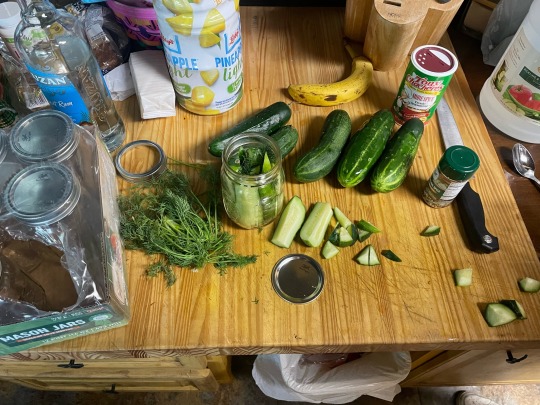
The cucumbers are ready pickle time
29 notes
·
View notes
Text


July, Harvest Time
Our neighbor Luciano told us that wheat was once cultivated in Lemmen. He reported that the community square, where the small church now stands (originally a farmhouse ruin donated to the people of the village to make it their chapel), was once slightly concave precisely to allow for the threshing of wheat.
This supports the hypothesis that Lemmen was one of the primordial settlements in the area that later gave rise to the village of Riomaggiore. Some of its terraces, exceptionally wide compared to the average, allowed for the sowing of wheat for the community.
We wanted to conduct an experiment to commemorate ancient times and to add another small piece to the biodiversity and varied food production of Stella di Lemmen.
Wheat has always been the food of man. The collection of spontaneous species that constituted its origins - a natural hybridization between pseudocereals and grasses - began with Paleolithic man and stabilized in the Neolithic with the practice of agriculture. Today wheat is cultivated all over the world - it is the second most produced cereal after corn and hundreds of species are counted - but it was already placed in Egyptian tombs as "food to take to the afterlife", and described in the Gospel of John by Jesus as a symbol of resurrection, through the analogy of the grain that dies to give the ear, survival, eternal life.
We wanted to reintroduce the cultivation of wheat in our farm, as a symbol of rebirth linked to food, nutrition, and prosperity. We have sown an ancient Lucchese wheat that has grown healthy and strong. Now that we have harvested and threshed it, all that remains is to make bread. We hope it is a good omen of growth and transformation for all humanity.
Luglio, tempo di mietitura
È stato Luciano (Bonanni n.d.r.) a raccontarci che a Lemmen un tempo si coltivava il grano. Ci ha riferito che la piazzetta della comunità, dove si affaccia ora la piccola chiesa (in origine un rudere contadino donato alle genti del borgo perché ne facessero la loro cappella), un tempo era leggermente concava proprio per permettere la battitura del grano.
Questo avvalora l’ipotesi che Lemmen fosse uno degli insediamenti primordiali della zona che in seguito diedero origine al paese di Riomaggiore. Alcune delle sue fasce, eccezionalmente larghe rispetto alla media, consentivano di seminare il grano per la comunità.
Noi abbiamo voluto fare un esperimento che commemorasse i tempi antichi, per aggiungere un altro piccolo tassello alla biodiversità e alla variegata produzione alimentare di Stella di Lemmen.
Il grano è da sempre il cibo dell’uomo. La raccolta delle specie spontanee che costituirono le sue origini - una naturale ibridazione tra pseudocereali e graminacee - iniziò con l’uomo del Paleolitico e si stabilizzò nel Neolitico con la pratica dell’agricoltura.
Oggi il grano è coltivato in tutto il mondo - è il secondo cereale per produzione dopo il mais e se ne contano centinaia di specie - ma venne già riposto nelle tombe egizie in quanto “alimento da portare nell’aldilà”, e descritto nel Vangelo di Giovanni, da Gesù, come simbolo di resurrezione, attraverso l’analogia del chicco che muore per dare la spiga, la sopravvivenza, la vita eterna.
Ci tenevamo a riproporre la coltura del grano nella nostra azienda, come simbolo di rinascita legato al cibo, all’alimentazione, alla prosperità. Abbiamo seminato un grano antico lucchese che è cresciuto sano e forte. Ora che l’abbiamo mietuto e battuto, non resta che fare il pane. Speriamo sia buon auspicio di crescita e di trasformazione per l’intera umanità.







3 notes
·
View notes
Text
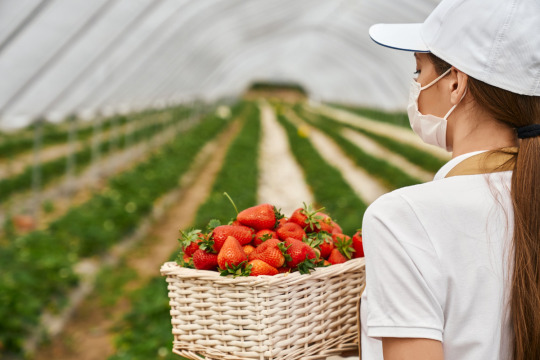
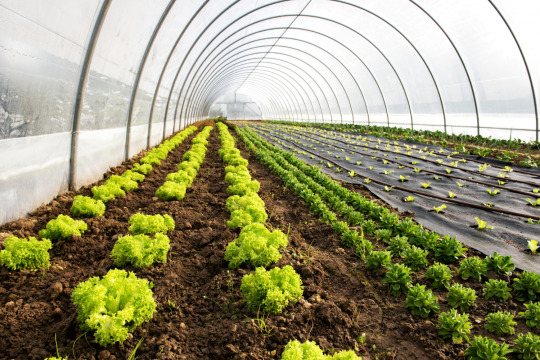
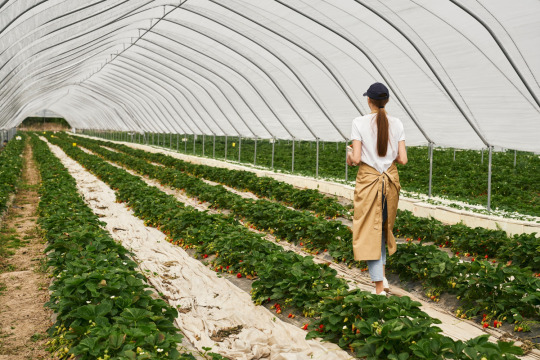
Why should you start organic farming 🎋🌿🌱☘️☘️🌾🌾🎋 via polyhouse structure? Indian government announced a big farming scheme for the farmers. 🌿🌱🎋🌾🎋🌿🌱🎋🌾🎋🌿🌱🎋🌾🎋🌿🌱🎋🌾🎋🌿🌱🎋🌾🎋🌿🌱🎋🌾🎋 In this scheme farmers get 50% subsidy of your poly farming invested price. it not fixed for all indian states, here are different subsidies options for different states.
🌾🌾 𝐇���𝐫𝐫𝐲𝐮𝐩 𝐟𝐨𝐫 𝐨𝐫𝐠𝐚𝐧𝐢𝐜 𝐟𝐚𝐫𝐦𝐢𝐧𝐠: +𝟗𝟏 𝟗𝟖𝟏𝟏𝟒𝟓𝟗𝟒𝟖𝟖
2 notes
·
View notes
Text
Randall Randy Konsker Guide The Top Benefits of Organic Farming You Need to Know
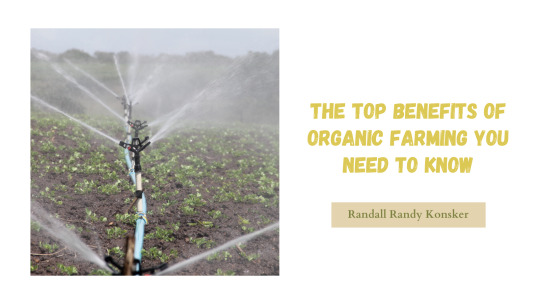
Organic farming has gained significant traction in recent years as consumers become increasingly conscious of their food choices and the impact of agriculture on the environment. Organic farming, characterized by the use of natural methods and avoiding synthetic pesticides and fertilizers, offers a range of benefits that extend beyond personal health. Randall Randy Konsker's guide we will explore the top benefits of organic farming and why it is gaining popularity worldwide.
1. Environmental Sustainability
One of the primary advantages of organic farming is its commitment to environmental sustainability. Organic farming methods prioritize soil health through practices such as crop rotation, cover cropping, and composting. By avoiding synthetic chemicals, organic farmers protect biodiversity, promote healthier ecosystems, and reduce the risk of soil erosion. This approach helps maintain the long-term fertility of the soil and minimizes the environmental impact of agriculture.
2. Reduced Chemical Exposure
Conventional farming relies heavily on synthetic pesticides and fertilizers to boost crop yields. However, the residues from these chemicals can end up in the food we consume, posing potential health risks. Organic farming eliminates or significantly reduces the use of synthetic chemicals, providing consumers with produce free from harmful residues. This reduction in chemical exposure has been linked to lower risks of certain health issues, making organic food an attractive choice for health-conscious individuals.
3. Improved Soil Health
Organic farming focuses on building and maintaining healthy soil. Practices such as crop rotation, cover cropping, and the use of organic matter like compost enhance soil structure, water retention, and microbial activity. Healthy soils support robust plant growth, increase nutrient content in crops, and contribute to overall ecosystem resilience. Additionally, the absence of synthetic fertilizers in organic farming prevents soil degradation, ensuring a sustainable and fertile environment for future generations.
4. Enhanced Nutritional Content
Several studies suggest that organic crops may have higher nutritional content compared to their conventionally grown counterparts. Organic farming practices, which prioritize soil health and diversity, often result in crops with increased levels of essential nutrients, antioxidants, and vitamins. This nutritional boost can positively impact human health and contribute to a well-rounded and balanced diet.
5. Support for Local Economies
Organic farming often occurs on a smaller scale and is more likely to be practiced by local farmers. Choosing organic products supports local economies by providing income and employment opportunities within communities. Additionally, the emphasis on local distribution reduces the carbon footprint associated with transporting goods over long distances, contributing to a more sustainable and resilient local food system.
6. Water Conservation
Organic farming practices prioritize efficient water management through techniques such as mulching, drip irrigation, and water-conserving cover crops. By minimizing water usage and runoff, organic farming helps conserve this precious resource. This is particularly crucial in regions facing water scarcity, as sustainable agricultural practices become essential for maintaining a reliable and resilient food supply.
Conclusion
The benefits of organic farming extend far beyond the individual consumer, reaching into the realms of environmental sustainability, public health, and local economies. Randall Randy Konsker says by choosing organic products, consumers play a vital role in supporting farming practices that prioritize the well-being of the planet and its inhabitants. As the demand for sustainable and ethically produced food continues to grow, organic farming stands as a beacon of a more conscientious and environmentally friendly approach to agriculture.
2 notes
·
View notes
Text
#agrotourism#farmvisit#nature#ecotourism#farmstay#agriculture#farming#kisanecofarmandhomestay#farm#organicfarm#agro#kisan
2 notes
·
View notes
Text
Unveiling the Nutritional Powerhouse: KP E-Mart’s Organic Ragi

Introduction:
In the heart of Hyderabad’s bustling markets, KP E-Mart stands out as a beacon of health and sustainability. Our latest offering, Organic Ragi, is not just a product; it’s a testament to our commitment to bringing the best of nature’s bounty to your doorstep.
Rich in fiber, calcium, and essential amino acids, it’s an ideal choice for health-conscious consumers. At KP E-Mart, we ensure that our Organic Ragi is sourced from the finest organic farms, guaranteeing purity and wholesomeness.
Why Choose KP E-Mart for Your Organic Ragi Needs?
Quality Assurance: Our rigorous quality checks ensure that every grain of Ragi you purchase is free from contaminants and packed with natural goodness.
Supporting Local Farmers: By choosing our Organic Ragi, you’re not just making a healthy choice; you’re also supporting the livelihoods of local farmers dedicated to organic farming practices.
Versatility in Cooking: Ragi’s versatility makes it perfect for a variety of dishes, from traditional porridges to contemporary baked goods, all while maintaining a balanced diet.
Organic Ragi Recipes to Try Delight in the rich, nutty flavor of Organic Ragi with our curated recipes. Whether you’re whipping up a quick Ragi dosa or a hearty Ragi soup, KP E-Mart’s Organic Ragi flour blends seamlessly into your culinary creations.
Sustainability at Its Core At KP E-Mart, sustainability is at the core of our operations. We take pride in offering products like Organic Ragi that not only benefit your health but also promote environmental stewardship.
Conclusion: Embrace the healthful embrace of Organic Ragi from KP E-Mart. Visit us in-store or online to explore our diverse range of organic products and take the first step towards a healthier lifestyle.
Discover the full potential of Organic Ragi. Shop now at KP E-Mart and join the organic revolution today!
#OrganicRagi#Ragi#OrganicMillet#HealthyGrains#Superfood#OrganicFood#HealthyEating#GlutenFree#Nutritious#MilletLove#RagiRecipes#WholeGrains#OrganicLifestyle#HealthyLiving#OrganicFarmers#SustainableEating#NaturalFoods#HealthyChoices#TraditionalGrains#RagiBenefits
0 notes
Text
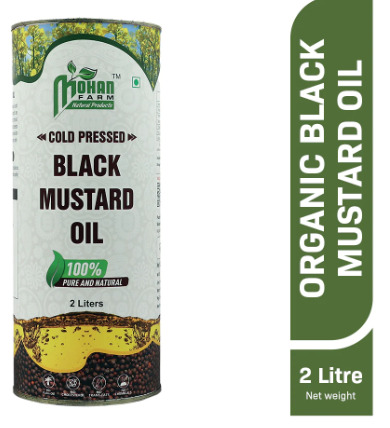
#OrganicMustardOil#HealthyCookingOil#HealthyLiving#OrganicLife#HealthyEating#NaturalCooking#OrganicKitchen#HealthyFood#OrganicFoodie#HealthyRecipes#OrganicFarming#HealthyLifestyle#OrganicCooking#HealthyChoices#OrganicIngredients#OrganicFarmers#HealthyOil
0 notes
Text

Beetroot is a very easy-to-grow vegetable that suffers from very few pests and diseases. The plant is generally easy to grow and is consistently ranked as one of the top 10 vegetables grown in home gardens. Beetroot is a cool-season vegetable crop.

This root veggie grows quickly and has many different varieties, which showcase deep red, yellow, or white bulbs of different shapes. It's nutritious, and you can eat both plant and root. This vegetable can survive frost and almost freezing temperatures, which makes it a great choice for northern gardeners and an excellent long-season crop.
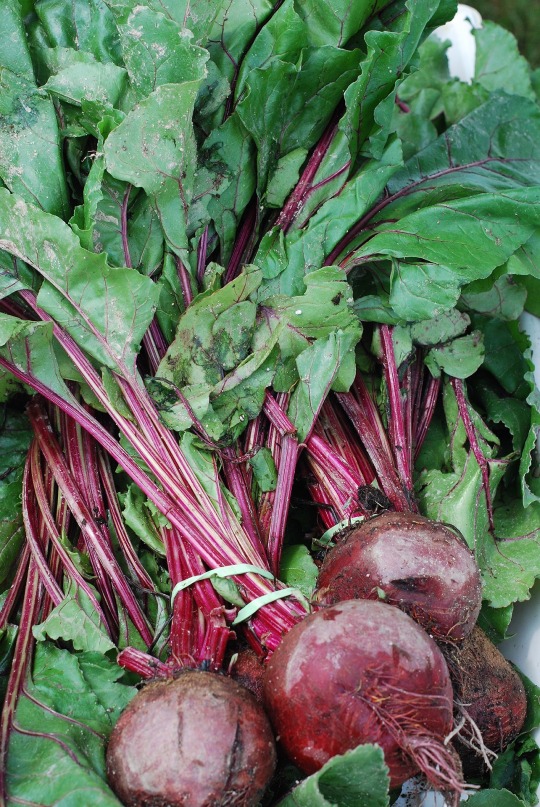
Keep reading; I'll teach you how to grow your own organic beetroot...
#gyo#lovegardening#gardening uk#gardenchat#gardening tips#gardening#garden#organic gardening#vegetable gardening#backyard#beetroot#beets#vegetables#vegetablegardening#growingvegetables#growingveggies#gardeningtips#organicgardening#organicfarming#growyourownfood#growyourownveggies#home and garden#gardenblr#gardencore#gardeners on tumblr#gardens#my garden#potted garden#urban gardening#vegetable garden
3 notes
·
View notes
Text

Weingartenpfirsichhof
www.weingartenpfirsichhof.com
TRUTH Bitterzitronenlikör
Renate Egger and Wilhelm Roseneder
Source: weingartenpfirsichhof.com
#renate egger#wilhelm roseneder#photography#Vineyardpeachfarm#Truttendorf/Carinthia#Grafenstein/Carinthia#Weingartenpfirsichhof#landscape gardening#Bitterzitrone#Bitterlemon#organicfarming#Biologische Landwirtschaft#Carinthia#Austria#landscape#TRUTH#Bitterzitronenlikör
7 notes
·
View notes
Text
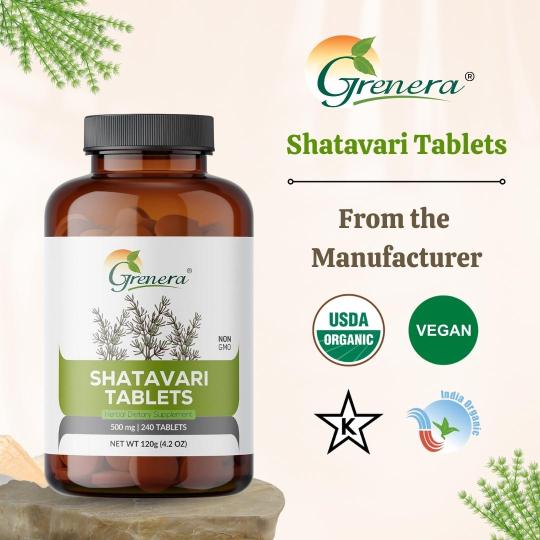
🌿 Discover the Power of Shatavari Tablets! 💪🌱 🌸 Boost Women's Health 🌿 Aid Digestion 🌟 Support Immunity 🌼 Balance Hormones 🌾 All-Natural & Holistic Wellness 📦 Shop Now for Your Well-Being
📚 Learn more on our website 👇 -------------------------------- To shop, Please Visit www.greneraorganics.in -------------------------------- WhatsApp - 99449 97512 --------------------------------
2 notes
·
View notes